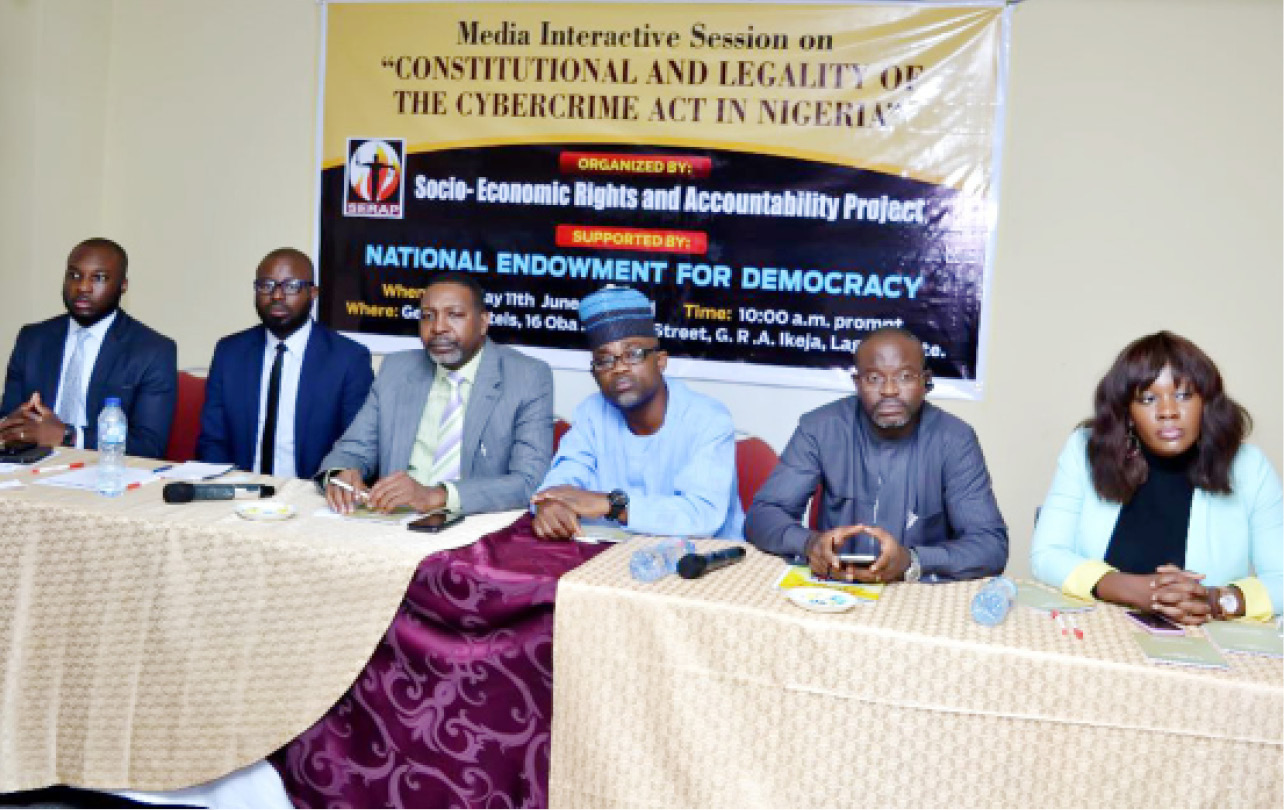Lawyers, others fault Cybercrimes Act
Lawyers, journalists and activists have declared the Cybercrimes Act as repressive, unconstitutional and illegal. This was disclosed during an interactive session on the ‘Constitutionality and Legality of the Cybercrimes Act in Nigeria’, which took place last Thursday in Lagos organized by the Socio-Economic Rights and Accountability Project (SERAP) in collaboration with the National Endowment for […]

Participants at the Cybercrime Act forum in Lagos recently
Lawyers, journalists and activists have declared the Cybercrimes Act as repressive, unconstitutional and illegal.
This was disclosed during an interactive session on the ‘Constitutionality and Legality of the Cybercrimes Act in Nigeria’, which took place last Thursday in Lagos organized by the Socio-Economic Rights and Accountability Project (SERAP) in collaboration with the National Endowment for Democracy (NED), USA.
The Cybercrime (Prohibition, Prevention etc) Act 2015, was passed into law in May 2015 to among others, prevent the use of the internet for perpetuation of various forms of cyber offences. Before its passage, Nigeria failed to enact any laws regulating cybercrimes.
Punishments under the Act
Under the Act, hackers, if found guilty of unlawfully accessing a computer system or network, are liable to a fine of up to N10 million or a term of imprisonment of five years.
The act makes provision for identity theft, with the punishment of imprisonment for a term of not less than three years or a fine of not less than N7 million or to both fine and imprisonment.
It specifically creates child pornography offences, with punishments of imprisonment for a term of 10 years or a fine of not less than N20 million or to both fine and imprisonment.
It outlaws cyber-stalking and cyber-bullying and prescribes punishment ranging from a fine of not less than N2 million or imprisonment for a term of not less than one year.
Criticism against the Act
The opponents said that there is a window of judicial intervention since two cases have travelled up to the apex court, including Okedara’s case.
The participants at the parley said the act was copied hook, line and sinker from the United Kingdom Postal Act of 1918, adding that the bill creating the Act was passed in a hurry by the National Assembly to avoid delay.
They unanimously declared the Nigeria’s Cybercrimes Act as “repressive, oppressive and unconstitutional,” adding that “The Act should immediately be repealed or dropped, as many of its provisions blatantly offend the rights to freedom of expression, association and media freedom.”
The Nigerian Cybercrime Act 2015 gives the President the power to designate certain computer systems, networks and information infrastructure vital to the national security of Nigeria or the economic and social well-being of its citizens, as constituting Critical National Information Infrastructure, and to implement procedures, guidelines, and conduct audits in furtherance of that.
The act prescribes death penalty for an offence committed against a system or network that has been designated critical national infrastructure of Nigeria that results in the death of an individual (amongst other punishments for lesser crimes).
Tayo Oyetibo (SAN) in his paper titled ‘The Constitutionality and Legality of the Cybercrimes Act in Nigeria’ harped on the supremacy of the Nigerian constitution under sections 1(3) and 24(1) on the offences in the act.
He said the Cybercrimes Act makes no effort to give certainty to the meanings of any of the words used in its section 24(1) by defining them anywhere in the Act, “which means that only judicial definitions can be given to those words in any case where a person is charged with an offence under Section 24(1) of the Act.”
The paper read in part: “In the context of the constitutionally guaranteed right of citizens to freedom of speech under the Nigerian constitution, there is the pressing question of whether the Cybercrimes Act is fit for the purpose pursuant to which it was enacted, particularly in view of the provisions of its section 24(1).”
“Apart from the above, every person is constitutionally guaranteed the right to freedom of expression, including freedom to hold opinions and to receive and impart ideas and information without interference under Section 39(1) of the Constitution. A scenario in which a person is bound by Section 24(1) of the Cybercrimes Act to second-guess the exercise of his right to freedom of expression under Section 39(1) of the Constitution is certainly not one contemplated by the constitution in any way,” he said.
Other participants said “freedom of speech and freedom of assembly are part of democratic rights of every citizen; our legislature must guard these rights jealously as they are part of the foundation upon which the government itself rests.”
According to them, Section 24(1) of the Cybercrimes Act portends grave danger for every person in Nigeria. This is by reason of the fact that at the time of issuing any communication in exercise of the right to freedom of expression, it is impossible for a person to determine whether or not an offence is being committed under the Cybercrimes Act. This is the exact scenario that the framers of the constitution sought to legislate against by the inclusion of the express provisions that are sections 36(12) and 39(1) of the constitution, they added.
Section “24(1) is a tool that readily lends itself to abuse and misuse by those in authority against freedom of expression in Nigeria. This is particularly because the Cybercrimes Act contains no safeguards whatsoever to the enforcement of Section 24, which carries with it severe criminal sanctions.”
On his part, the Head, Cybercrimes Prosecution Unit, Federal Ministry of Justice, Terlumun George Tyendezwa, said the Ministry of Justice is committed to pursuing the amendment of the Act.
Those present at the interactive session included: representatives of the National Human Rights Commission, Amnesty International, Wole Soyinka Center for Investigative Journalism, Media Rights Agenda, the German Consulate and Director General of the National Orientation Agency.
